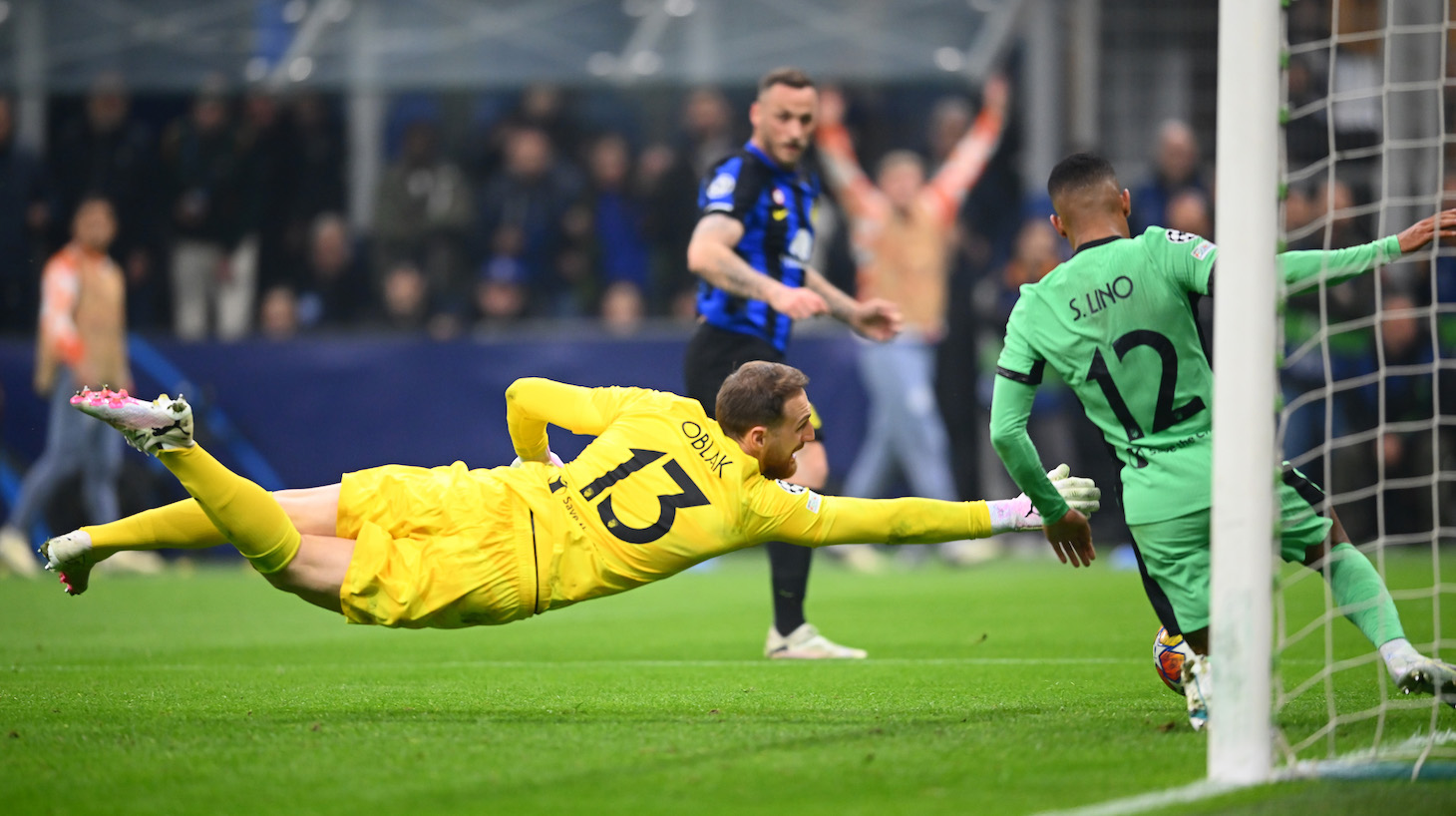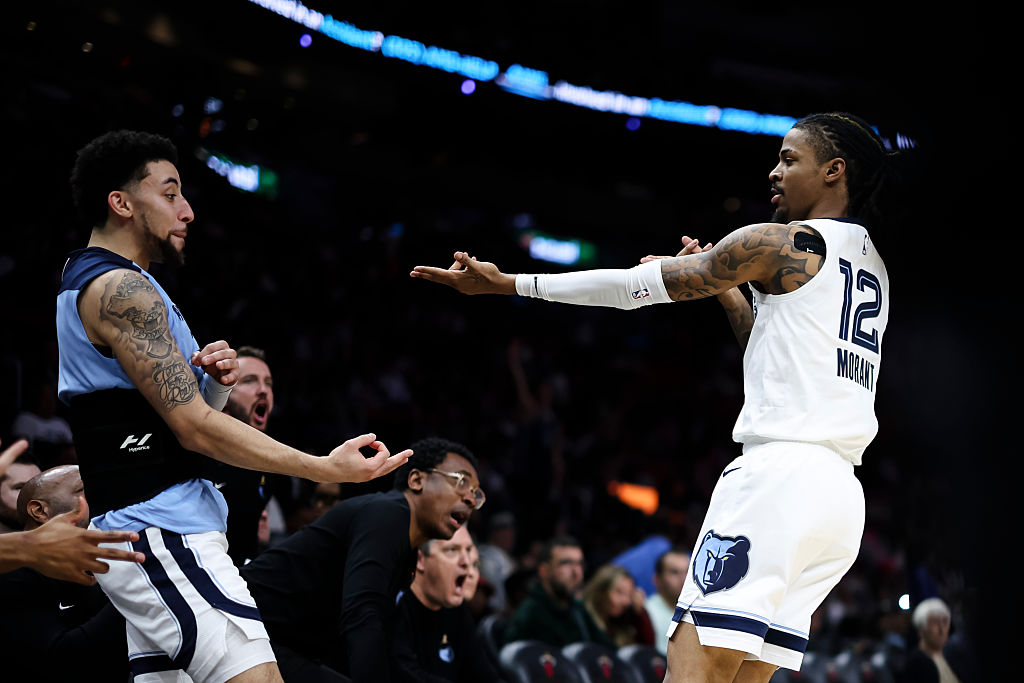It is to manager Diego Simeone's great credit that the current iteration of Atlético Madrid looks almost nothing like the Atlético Madrid teams with which he first made his name. Slowly, and probably born more out of necessity than conviction, Atleti has transformed from a team of impregnable defenses and rare but ruthless attacks into an outfit of sleek, fulsome attacks and a defense as impregnable as an unlocked Kia. But if this development supports the idea that you can in fact teach an old dog new tricks, the Colchoneros' performance in their drab 1-0 loss to Inter in the Champions League on Tuesday proves that, when the tension is high and the pressure is on, it's difficult for that dog to resist reflexively go back to rolling over and playing dead.
Even when the most attack-minded managers are involved, European knockout matches tend to be cautious, slow-burning affairs. So it's not like anyone could rightly ask Simeone to set his team up to go galavanting forth in search a 4-2 shootout win in the away first leg of this round of 16 tie. Nevertheless, right from the announcement of the lineups—midfielder/wing back Marcos Llorente favored in attack to the revitalized Álvaro Morata, prematurely washed Saúl Ñíguez picked in midfield over hotshot upstart Pablo Barrios—you could notice hints of the old cholismo in the air. Which is not in itself a bad thing. Cholismo is after all what twice brought Atlético to the final of this competition and on two other occasions won them the Europa League trophy. The problem is trying to play the old way with this new team, and in doing so neutering what the group is best at while exposing its biggest weakness.
To be fair to Simeone, his plan did just about work during the first 45 minutes of play. It helped that Inter also started the game in cagey fashion. The Italians' reluctance to commit too fully to any given attack, no doubt wary of what Antoine Griezmann might create in the other direction, meant they didn't put much of a squeeze on Atleti's soft defense. The opening half was tight, intense, and well-played, short on expansive attacking moves and long on tactical battles and contested duels. It was, in a word, boring. And Simeoneball thrives on boring.
While both Atleti and Inter seemed content to take a scoreless draw into halftime, Inter had different designs on the second 45 minutes. Right from the outset, you could feel the Nerazzurri's mindset switch into a more aggressive mode. One play in particular, in the 48th minute, made clear their intentions.
Building a possession deep in their own half, Inter goalkeeper Yann Sommer saw a slow-rolling pass head his way with an Atlético forward bearing down on him. Rather than punt the ball clear, Sommer just got off a bumpy pass down the line to Benjamin Pavard. With the bounding ball and another Atleti presser coming toward him, Pavard coolly sidefooted the ball midway through a hip-high bounce, which found Matteo Darmian in a little bit of space. Darmian flipped the ball forward to Lautaro Martínez, who knocked an outside-of-the-boot through pass onto a Henrikh Mkhitaryan run. With that, Inter was into Atleti's half and off to the races. Mkhitaryan passed it wide to Federico Dimarco, who lumped a big cross into the heart of Atleti's penalty box, where a lunging Marko Arnautovic reached the ball but volleyed it over the goal. The bravery of Inter's buildup, the brilliance of Pavard's press-breaking flick, the speed and venom of the resulting attack, the immediacy with which the team switched from its first-half prudence to its second-half dynamism—in that one play you could see many of the reasons Inter is currently one of the best teams in the world. Inter would go on to demonstrate this several more times throughout the second half, and Atlético was almost helpless in the face of it.
Simeone loves to talk about the importance of "suffering," of being under the cosh and knowing how to buckle down and resist. His old Atleti teams were built to suffer defensively, and had the weapons—say, Diego Costa's strength, Yannick Carrasco's speed, Griezmann's vision—in attack to turn the brief spells of respite into goals. The new Atleti doesn't have any of that. Costa and Carrasco are gone, their replacements have been only decent, and while Griezmann is still amazing, the 32-year-old no longer has the legs to spark and guide counter attacks the way he used to. And on the defensive side, Atlético finds itself "suffering" practically every time the opponent crosses the halfway line.
The old Atleti might concede deep possessions and even give up a barrage of shots, but it did so knowing it had the wherewithal to endure, to stymie those possessions and block those shots in a way that made them less dangerous than they might otherwise appear. This Atleti does not share those traits. That Tuesday's match remained goalless for so long—Inter's wholly deserved breakthrough didn't come until the 79th minute—and the final scoreline finished deceptively narrow, had less to do with Atleti's good defending (though Axel Witsel had a great game) and more with Inter's errant finishing. Had Martínez and especially Arnautovic come into the game with their sights better calibrated, they could've all but killed this tie off in the first leg.
Both before and after Inter's opener, Atlético never looked serious threats to score. Without a real attacking partner for most of the day, Griezmann looked toothless. The only regular source of anything close to danger came from Samuel Lino down the left wing, and though the Brazilian did well eating up space Inter offered him and cutting inside in search of a shot, it was always going to be too much to ask for a role player like him to win his team the game. The Colchoneros were stuck between two worlds; they tried to recapture the old defensiveness that had previously brought them so much glory, failed to do so, and, along the way, they abandoned the attacking verve that can make the present team so formidable when things are clicking.
You can only fault Simeone but so much for the team's failed gameplan. The Atlético evolution he's overseen is still new, and in a tournament of such high stakes and small margins, you can understand why he'd feel most comfortable returning to had worked so well before, a style that focuses more on shrinking the opponent's chances than on enlarging your own possibilities. And it may only be luck that kept Atleti's deficit from being bigger, but luck is just as much a part of the game as managerial tactics and player skill are.
Atlético will take this manageable margin back to Madrid with them next month, where they absolutely have the ability to turn things around. To do so, they'll need to show a version of themselves that looks more like the Atleti of the present than the one of the past.






